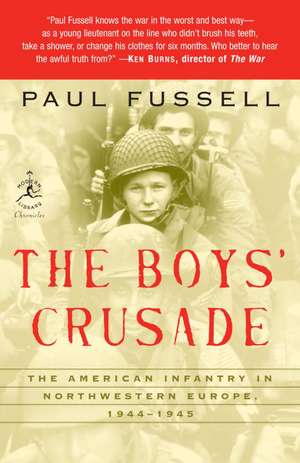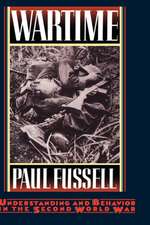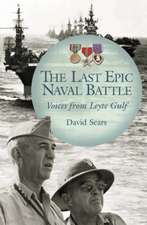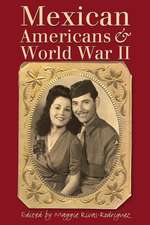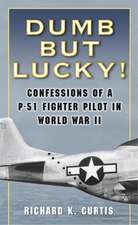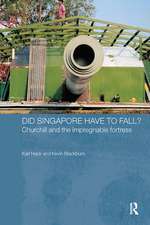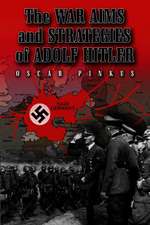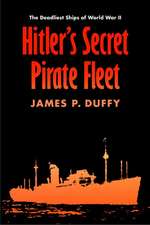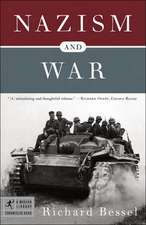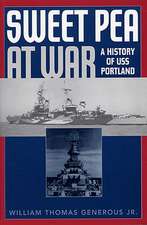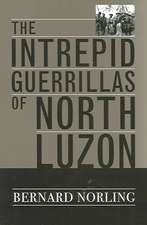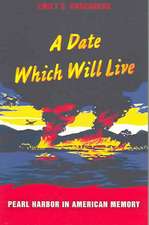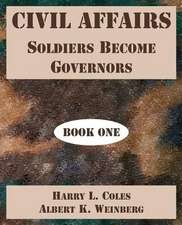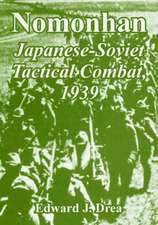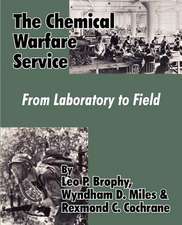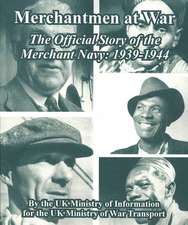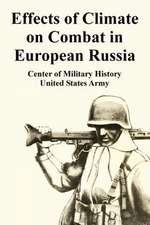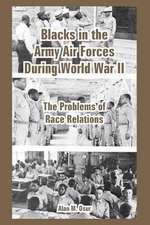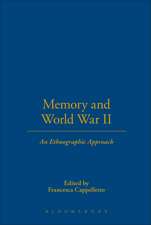The Boys' Crusade: The American Infantry in Northwestern Europe, 1944-1945
Autor Paul Fussellen Limba Engleză Paperback – 31 aug 2005
“A chronicle should deal with nothing but the truth,” Fussell writes in his Preface. Accord-ingly, he eschews every kind of sentimentalism, focusing instead on the raw action and human emotion triggered by the intimacy, horror, and intense sorrows of war, and honestly addressing the errors, waste, fear, misery, and resentments that plagued both sides. In the vast literature on World War II, The Boys’ Crusade stands wholly apart. Fussell’s profoundly honest portrayal of these boy soldiers underscores their bravery even as it deepens our awareness of their experiences. This book is both a tribute to their noble service and a valuable lesson for future generations.
From the Hardcover edition.
Preț: 103.54 lei
Nou
Puncte Express: 155
Preț estimativ în valută:
19.81€ • 21.52$ • 16.64£
19.81€ • 21.52$ • 16.64£
Carte disponibilă
Livrare economică 01-15 aprilie
Preluare comenzi: 021 569.72.76
Specificații
ISBN-13: 9780812974881
ISBN-10: 0812974883
Pagini: 184
Dimensiuni: 134 x 203 x 12 mm
Greutate: 0.16 kg
Ediția:Modern Library.
Editura: Modern Library
ISBN-10: 0812974883
Pagini: 184
Dimensiuni: 134 x 203 x 12 mm
Greutate: 0.16 kg
Ediția:Modern Library.
Editura: Modern Library
Recenzii
“This is a former warrior’s haunting meditation on the terrible, yet often necessary, destructiveness of total warfare. Written with passion and fidelity, The Boys’ Crusade is a book that will not leave you after you have put it down. If there is a more powerful personal account of the ground war in Western Europe I have yet to encounter it.” —Donald L. Miller, author of The Story of World War II
“No one writes about war with greater authenticity and eloquence than Paul Fussell. The Boys’ Crusade is an extraordinarily powerful account that is at once poignant and searing. It is a truth-telling of a very high order from one of our finest men of letters.” —Rick Atkinson, Pulitzer Prize–winning author of An Army at Dawn
“Fussell writes vividly and sardonically . . . painting extraordinary scenes at every turn. . . . A bracing corrective . . . and just right for a new season of war.” —Kirkus Reviews (starred review)
From the Hardcover edition.
“No one writes about war with greater authenticity and eloquence than Paul Fussell. The Boys’ Crusade is an extraordinarily powerful account that is at once poignant and searing. It is a truth-telling of a very high order from one of our finest men of letters.” —Rick Atkinson, Pulitzer Prize–winning author of An Army at Dawn
“Fussell writes vividly and sardonically . . . painting extraordinary scenes at every turn. . . . A bracing corrective . . . and just right for a new season of war.” —Kirkus Reviews (starred review)
From the Hardcover edition.
Notă biografică
Paul Fussell is the author of fifteen books, including Wartime: Understanding and Behavior in the Second World War and The Great War and Modern Memory, which won the National Book Award and the National Book Critics Circle Award and was named by the Modern Library as one of the twentieth century’s 100 best nonfiction books. He taught literature for many years at the University of Pennsylvania and Rutgers University. He lives in Philadelphia with his wife.
From the Hardcover edition.
From the Hardcover edition.
Extras
The Boy Crusaders
When Ike Eisenhower was a boy, European history was more avidly pursued in schools than now, and it’s also possible that he knew a bit about the Crusades from his own reading, if he hadn’t heard about them in church—his family was pious—or at elementary or high school or even at West Point. In any event, the imagery of the Crusades was lodged strongly in his mind. In an Order of the Day given or read to “Soldiers, Sailors, and Air- men of the Allied Expeditionary Force,” just before the invasion of Normandy, he informed them: “You are about to embark upon the Great Crusade, toward which we have striven these many months.” And, once successfully over, he would title his memoir of the war Crusade in Europe.
Eisenhower was not the only one conscious during the war of the Crusades. One of the enemy, Panzer leader Hans von Luck, had occasion three times to recall a poem about a military moment in the Crusades whose horrors resembled those he witnessed in the Falaise Pocket in 1944. He writes, “ ‘Man, horse, and truck, by the Lord were struck.’ This saying, from a poem on the battles of the Crusaders in Palestine about 1213, had come to my mind twice before: in December, 1941, by Moscow, and in 1943 in North Africa.”
The date 1213 suggests the so-called Children’s Crusade, about whose actuality some historians have doubts. In the year 1212, it is said, an odd army set out from France and Germany. Its purpose was to liberate the Holy Land from the profane grip of Islam. This Crusade is reputed to have numbered fifty thousand young people, of whom only three thousand survived the attentions of pirates, slave dealers, and brothel keepers. Whether actual or mythical, the Children’s Crusade can’t help suggesting many dimensions of American youth’s curious, violent journey eastward over France and Germany in the Second World War. Kurt Vonnegut invokes The Children’s Crusade as a sardonic alternative title for his novel Slaughterhouse Five, which measures many significant features of that war and those “children.”
I intend no disrespect to the memory of Dwight D. Eisenhower by examining his term crusade. It made some sense at the moment, even if many of the still unblooded troops were likely to ridicule it. If they read or heard the Supreme Commander’s words at all, they were doubtless embarrassed to have so highfalutin a term applied to their forthcoming performances and their feelings about them. It is likely that many never saw the sheet of paper on which the word appeared, and if the message was read to them (in the wind and the rain), their military experience so far had inclined them to greet all official utterances with scorn and skepticism. Indeed, when such pronouncements were read aloud they often ridiculed them noisily, until silenced by a sergeant’s “At ease!”
At this distance, it may not be easy to remember that the European ground war in the west was largely fought by American boys seventeen, eighteen, and nineteen years old. At seventeen you could enlist if you had your parents’ written permission, but most boys waited until they were drafted at age eighteen. (Actually, the army contained numerous illicit seventeen-year-olds, their presence as soldiers more or less regularized by false papers not rigorously inquired into.) Some of these men-children shaved but many did not need to. Robert Kotlowitz remembers bayonet drill. “We aimed, thrust, slashed or whichever—screaming ‘Kill! Kill!’ in our teen-age voices.” Not a few soldiers hopeful of food packages from home specified Animal Crackers, which, one soldier said, “can do wonders for low morale.” (Perhaps what troops were recalling when seeking this specialty was eight-year-old Shirley Temple singing “Animal Crackers in My Soup.”) At the same time, the infantrymen, not yet versed in the adult conventions of the high-class uses of wine, did not wait until after dinner to sip a little cognac. In quantity, it often replaced water in their canteens.
Who were these boys, who bitched freely but seldom cried, even when wounded? What did they have in common? Most had sufficient emotional control not to express angry envy of those (like, say, nonflying air corps troops) who had a nicer, safer war.
These infantry soldiers, if they weren’t children, weren’t quite men either, even if officers commonly addressed groups of them as such. One medical aidman was typical in referring to his patients as boys. Explaining in a letter home the workings of the casualty-clearing system, he falls naturally into phrases like these—a boy gets hurt; the injured boy; leaves space for another boy; the wounded boy; as each boy comes in; a brief history of the boy and his diagnosis—the last of which refers to the official tag fastened to the soldier’s jacket or, as our aidman puts it, to “the boy’s coat.” Wounded officers passing through the aid station were never called boys, although many were almost as young.
Taken as a whole, the boys had a powerful propulsion of optimism, a sense that the war couldn’t last forever, and that if anyone was going to get wounded, it would not be them. They had a common ability to simulate courage despite actuality: that is, a certain amount of dramatic talent, plus a vivid appreciation of black humor, involving plenty of irony. They had sufficient physical stamina to survive zero-degree cold from time to time, and considerable elementary camping skills of the sort common among civilian fishermen and hunters, which lots of survivors became after the war. They had to have fine eyesight, good enough to detect planted antipersonnel mines by their little triggers of thin wire protruding aboveground. They had to have a pack rat’s skill in collecting small objects, like looted knives and forks. And preeminently, they had to have extraordinary luck. One infantryman’s mother exhorted him to be careful. He answered: “You can’t be careful. You can only be lucky.”
And these young troops got along with each other because they usually shared certain beliefs:
1. America is the best country in the world because it is the only really modern one.
2. It is the world leader in technology, producing the bulk of the good cars, and, in unbelievably large quantities, airplanes and tanks, which, being the best in the world, are going to win the war. They are certainly better than anything the Germans and the Japs can make. (Only the brightest and boldest of the troops perceived that American tanks were seriously outgunned by German ones and, when struck by a shell, were likely to burst into flames, almost as a matter of course. This tendency earned them the name Ronsons, after the popular cigarette lighter.) Among the troops, only the finely tuned noted the superiority of the German machine guns. Discovery of these facts was demoralizing, and a problem confronting the brighter U.S. infantrymen was rationalizing away these sorry truths when among dumber people.
3. The American army, despite its screwups, is the best ever in providing the troops with clothing, food, lodging, personal weapons, and security.
These credulous youths were the products of American high schools, and differences of race, religion, and social class did not significantly alter their adherence to this code of belief nor influence their common hatreds, which can be specified as follows:
1. Officers of any kind, especially those not to a degree redeemed by sharing troops’ hardships, and those pursuing in wartime their peacetime professions in uniform, like medicine, optometry, or medical administration. These phonies were granted officer rank and beautiful dress uniforms without having to undergo the usual price of painful infantry training.
2. The French, and quite justly too: they spoke a language impossible to learn and embarrassing to pronounce, and worse, they required the help of strangers (especially Americans) to win their wars, both the First World War and this one. In his most famous harangue of the troops, General Patton had enunciated the American view of people who lose wars or battles: “Americans love a winner. Americans will not tolerate a loser.” And the French of all types were distinctly snotty toward their saviors.
3. Stay-at-homes exempt from the war by virtue of largely invisible ailments, like punctured eardrums, high blood pressure, flat feet, or a “nervous condition.” Even self- proclaimed “homosexuality.”
4. Anyone occupying in combat a position to the rear of the infantryman. Included are soldiers in the artillery, all engineers except combat engineers, and certainly the various staff, afraid to visit the line and to see what’s actually happening there.
Military historian Roger Spiller, who has spent decades studying the embarrassing actualities of battle, quotes with approval Bernard Knox, who writes, “It is true of every war that much as he may fear and perhaps even hate the enemy opposing him, the combat infantryman broods with deep and bitter resentment over the enormous number of people in his rear who sleep safely at night.” And it was an enormous number. Spiller explains: “Of the millions of Americans sent overseas by the Army during World War II, only 14 percent were infantrymen. Those 14 percent took more than 70 percent of all the battle casualties among overseas troops.” As Captain Harold P. Leinbaugh, author of the memoir The Men of Company K, proclaims, “We were the Willie Lomans of the war.” Or, as some coarser speakers have put it, “the niggers.” Soldiers who fought in North Africa and Southern Italy, struck by the squalor and filth of the peasants, thought of them as “the Infantry of the World.”
“Adolescent fervor” is Robert Kotlowitz’s term for those characteristics of male youth that can be honed and intensified by military training. “The Army understood that fervor and used it,” he writes. “All armies do; they depend upon it.” Adolescent fervor in the form it assumed be- fore bullets and artillery and mines ruined it is pleasantly registered by Edward W. Wood Jr., an enthusiastic—no, ecstatic—soldier as he participated in the victorious pursuit of the enemy in late August 1944:
From the Hardcover edition.
When Ike Eisenhower was a boy, European history was more avidly pursued in schools than now, and it’s also possible that he knew a bit about the Crusades from his own reading, if he hadn’t heard about them in church—his family was pious—or at elementary or high school or even at West Point. In any event, the imagery of the Crusades was lodged strongly in his mind. In an Order of the Day given or read to “Soldiers, Sailors, and Air- men of the Allied Expeditionary Force,” just before the invasion of Normandy, he informed them: “You are about to embark upon the Great Crusade, toward which we have striven these many months.” And, once successfully over, he would title his memoir of the war Crusade in Europe.
Eisenhower was not the only one conscious during the war of the Crusades. One of the enemy, Panzer leader Hans von Luck, had occasion three times to recall a poem about a military moment in the Crusades whose horrors resembled those he witnessed in the Falaise Pocket in 1944. He writes, “ ‘Man, horse, and truck, by the Lord were struck.’ This saying, from a poem on the battles of the Crusaders in Palestine about 1213, had come to my mind twice before: in December, 1941, by Moscow, and in 1943 in North Africa.”
The date 1213 suggests the so-called Children’s Crusade, about whose actuality some historians have doubts. In the year 1212, it is said, an odd army set out from France and Germany. Its purpose was to liberate the Holy Land from the profane grip of Islam. This Crusade is reputed to have numbered fifty thousand young people, of whom only three thousand survived the attentions of pirates, slave dealers, and brothel keepers. Whether actual or mythical, the Children’s Crusade can’t help suggesting many dimensions of American youth’s curious, violent journey eastward over France and Germany in the Second World War. Kurt Vonnegut invokes The Children’s Crusade as a sardonic alternative title for his novel Slaughterhouse Five, which measures many significant features of that war and those “children.”
I intend no disrespect to the memory of Dwight D. Eisenhower by examining his term crusade. It made some sense at the moment, even if many of the still unblooded troops were likely to ridicule it. If they read or heard the Supreme Commander’s words at all, they were doubtless embarrassed to have so highfalutin a term applied to their forthcoming performances and their feelings about them. It is likely that many never saw the sheet of paper on which the word appeared, and if the message was read to them (in the wind and the rain), their military experience so far had inclined them to greet all official utterances with scorn and skepticism. Indeed, when such pronouncements were read aloud they often ridiculed them noisily, until silenced by a sergeant’s “At ease!”
At this distance, it may not be easy to remember that the European ground war in the west was largely fought by American boys seventeen, eighteen, and nineteen years old. At seventeen you could enlist if you had your parents’ written permission, but most boys waited until they were drafted at age eighteen. (Actually, the army contained numerous illicit seventeen-year-olds, their presence as soldiers more or less regularized by false papers not rigorously inquired into.) Some of these men-children shaved but many did not need to. Robert Kotlowitz remembers bayonet drill. “We aimed, thrust, slashed or whichever—screaming ‘Kill! Kill!’ in our teen-age voices.” Not a few soldiers hopeful of food packages from home specified Animal Crackers, which, one soldier said, “can do wonders for low morale.” (Perhaps what troops were recalling when seeking this specialty was eight-year-old Shirley Temple singing “Animal Crackers in My Soup.”) At the same time, the infantrymen, not yet versed in the adult conventions of the high-class uses of wine, did not wait until after dinner to sip a little cognac. In quantity, it often replaced water in their canteens.
Who were these boys, who bitched freely but seldom cried, even when wounded? What did they have in common? Most had sufficient emotional control not to express angry envy of those (like, say, nonflying air corps troops) who had a nicer, safer war.
These infantry soldiers, if they weren’t children, weren’t quite men either, even if officers commonly addressed groups of them as such. One medical aidman was typical in referring to his patients as boys. Explaining in a letter home the workings of the casualty-clearing system, he falls naturally into phrases like these—a boy gets hurt; the injured boy; leaves space for another boy; the wounded boy; as each boy comes in; a brief history of the boy and his diagnosis—the last of which refers to the official tag fastened to the soldier’s jacket or, as our aidman puts it, to “the boy’s coat.” Wounded officers passing through the aid station were never called boys, although many were almost as young.
Taken as a whole, the boys had a powerful propulsion of optimism, a sense that the war couldn’t last forever, and that if anyone was going to get wounded, it would not be them. They had a common ability to simulate courage despite actuality: that is, a certain amount of dramatic talent, plus a vivid appreciation of black humor, involving plenty of irony. They had sufficient physical stamina to survive zero-degree cold from time to time, and considerable elementary camping skills of the sort common among civilian fishermen and hunters, which lots of survivors became after the war. They had to have fine eyesight, good enough to detect planted antipersonnel mines by their little triggers of thin wire protruding aboveground. They had to have a pack rat’s skill in collecting small objects, like looted knives and forks. And preeminently, they had to have extraordinary luck. One infantryman’s mother exhorted him to be careful. He answered: “You can’t be careful. You can only be lucky.”
And these young troops got along with each other because they usually shared certain beliefs:
1. America is the best country in the world because it is the only really modern one.
2. It is the world leader in technology, producing the bulk of the good cars, and, in unbelievably large quantities, airplanes and tanks, which, being the best in the world, are going to win the war. They are certainly better than anything the Germans and the Japs can make. (Only the brightest and boldest of the troops perceived that American tanks were seriously outgunned by German ones and, when struck by a shell, were likely to burst into flames, almost as a matter of course. This tendency earned them the name Ronsons, after the popular cigarette lighter.) Among the troops, only the finely tuned noted the superiority of the German machine guns. Discovery of these facts was demoralizing, and a problem confronting the brighter U.S. infantrymen was rationalizing away these sorry truths when among dumber people.
3. The American army, despite its screwups, is the best ever in providing the troops with clothing, food, lodging, personal weapons, and security.
These credulous youths were the products of American high schools, and differences of race, religion, and social class did not significantly alter their adherence to this code of belief nor influence their common hatreds, which can be specified as follows:
1. Officers of any kind, especially those not to a degree redeemed by sharing troops’ hardships, and those pursuing in wartime their peacetime professions in uniform, like medicine, optometry, or medical administration. These phonies were granted officer rank and beautiful dress uniforms without having to undergo the usual price of painful infantry training.
2. The French, and quite justly too: they spoke a language impossible to learn and embarrassing to pronounce, and worse, they required the help of strangers (especially Americans) to win their wars, both the First World War and this one. In his most famous harangue of the troops, General Patton had enunciated the American view of people who lose wars or battles: “Americans love a winner. Americans will not tolerate a loser.” And the French of all types were distinctly snotty toward their saviors.
3. Stay-at-homes exempt from the war by virtue of largely invisible ailments, like punctured eardrums, high blood pressure, flat feet, or a “nervous condition.” Even self- proclaimed “homosexuality.”
4. Anyone occupying in combat a position to the rear of the infantryman. Included are soldiers in the artillery, all engineers except combat engineers, and certainly the various staff, afraid to visit the line and to see what’s actually happening there.
Military historian Roger Spiller, who has spent decades studying the embarrassing actualities of battle, quotes with approval Bernard Knox, who writes, “It is true of every war that much as he may fear and perhaps even hate the enemy opposing him, the combat infantryman broods with deep and bitter resentment over the enormous number of people in his rear who sleep safely at night.” And it was an enormous number. Spiller explains: “Of the millions of Americans sent overseas by the Army during World War II, only 14 percent were infantrymen. Those 14 percent took more than 70 percent of all the battle casualties among overseas troops.” As Captain Harold P. Leinbaugh, author of the memoir The Men of Company K, proclaims, “We were the Willie Lomans of the war.” Or, as some coarser speakers have put it, “the niggers.” Soldiers who fought in North Africa and Southern Italy, struck by the squalor and filth of the peasants, thought of them as “the Infantry of the World.”
“Adolescent fervor” is Robert Kotlowitz’s term for those characteristics of male youth that can be honed and intensified by military training. “The Army understood that fervor and used it,” he writes. “All armies do; they depend upon it.” Adolescent fervor in the form it assumed be- fore bullets and artillery and mines ruined it is pleasantly registered by Edward W. Wood Jr., an enthusiastic—no, ecstatic—soldier as he participated in the victorious pursuit of the enemy in late August 1944:
From the Hardcover edition.
Descriere
Based in part on the author's own experiences, this volume provides a stirring narrative of what World War II was actually like, from the point of view of the children who fought it.
